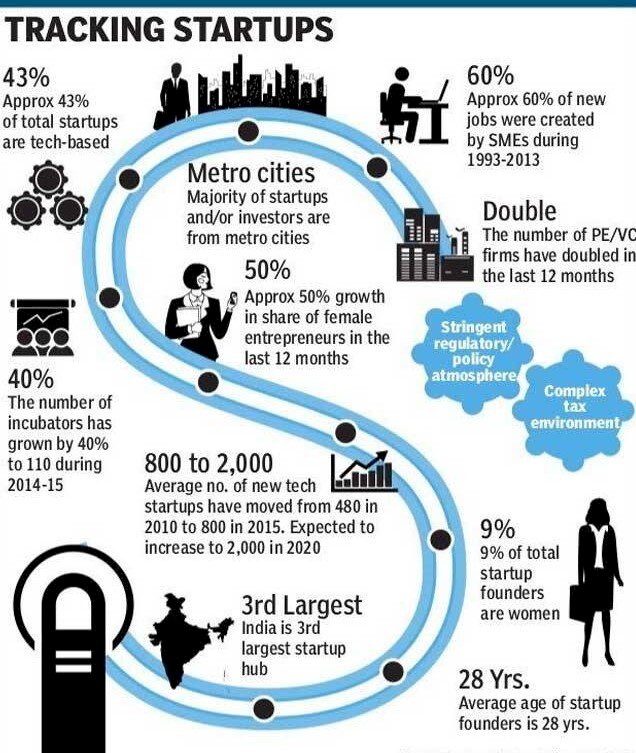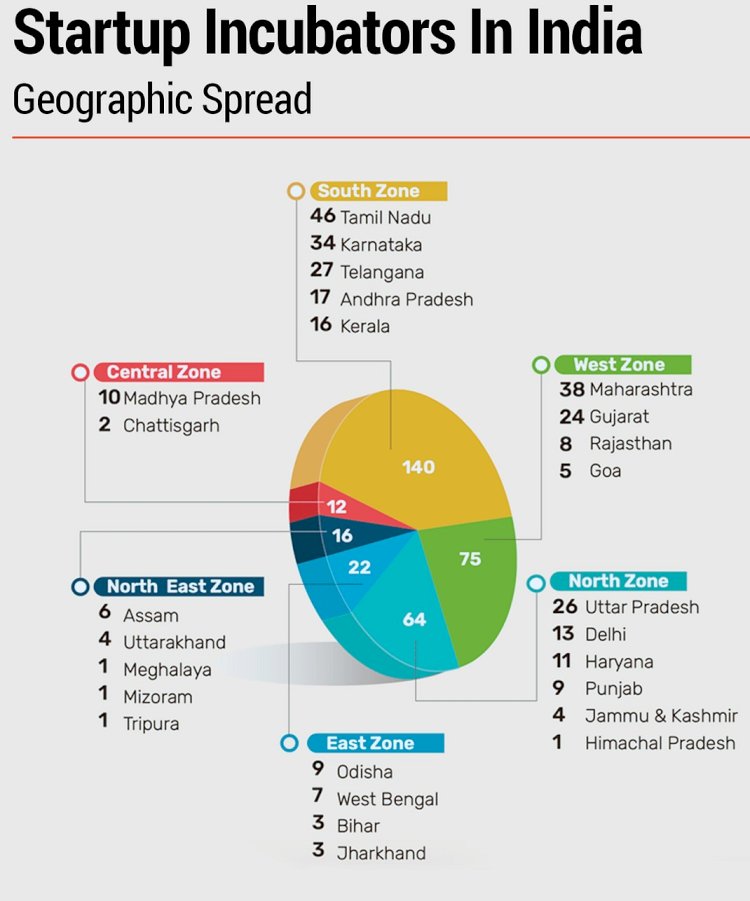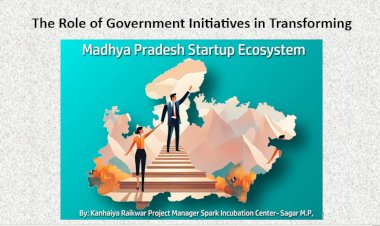Incubation in India: A Geographical Analysis
Between 2000 and 2020, the number of startup incubators in India increased by 15 times. Most contributions come from the southern and western states, and non-metro cities. Incubators provide workspace, seed funding, mentoring, and training to help entrepreneurs grow their businesses. The states with the most incubators are Tamil Nadu (46), Maharashtra (38), and Karnataka (34). The National Capital Region has the highest physical density. A shift toward virtual incubation may have an impact on the location of incubators in smaller towns.


Incubation in India: A Geographical Analysis
Between 2000 and 2020, the number of startup incubators in India increased by 15 times, with the most contributions coming from the southern and western states, and non-metro cities preparing to become future startup capitals.
Defined Startup Incubators
A startup incubator is a group of people working together to help new businesses succeed. Incubators provide workspace, seed funding, mentoring, and training to help entrepreneurs solve some of the problems that come with running a business. (see list below for some common incubator services). A startup incubator's sole purpose is to assist entrepreneurs in growing their businesses.
Startup incubators are typically non-profit organisations run by both public and private organisations. Some business schools allow their students and alumni to participate in incubators, which are often associated with universities.
However, governments, civic groups, startup organisations, and successful entrepreneurs have formed a number of other incubators.
Although most of the attention in the media is on tech startups, incubators aren't just for that.

What are the Most Common Services Provided by Startup Incubators?
The following is a list of the most common business incubator services:
- Assistance with business fundamentals
- Opportunities for networking
- Assistance with marketing
- Internet access at a high speed
- Assistance with accounting and financial management
- Bank loans, loan funds, and guarantee programmes are all available
- Assistance with public speaking abilities
- Connections to resources for higher education
- Partnerships with strategic partners
- Angel investors and venture capitalists are available.
- Business training programmes that are comprehensive
- Mentors and advisory boards
- Identification of the management team
- Business etiquette assistance
- Assistance with technology commercialization
- Compliance requirements assistance
- Intellectual property management and legal counsel
Startup incubators are an essential component of the startup ecosystem. The following are some of the best incubation centres in India:
- CIIE IIMA
- IAN incubator
- Incubation Masters
- STEP
- Nsrcel
- CEI IIMC
- Kerala Startup Mission
- IIML - Incubator
- pupilfirst
- Villgro
Incubators in India are spread across the country.
The southern states (Tamil Nadu, Karnataka, Telangana, Andhra Pradesh, and Kerala) and the western states (Maharashtra, Gujarat, Rajasthan, and Goa) have seen the most growth in the number of incubators. Several factors, including burgeoning business activity, could be at play in this skewed regional growth. As a result of Covid-19, incubation may shift significantly to virtual platforms.
Incubators can now be found across the country's geographic landscape, including in areas that have remained physically or socio-politically difficult to reach (such as the states of Assam, Manipur, and Jammu and Kashmir).
The states with the most incubators are Tamil Nadu (46), Maharashtra (38), and Karnataka (34) respectively. With one incubator for every 138 square kilometers, the National Capital Region has the highest physical density.

While the high density of incubators in Maharashtra and the National Capital Region can be attributed to the fact that these areas are hubs of economic activity, the high density of incubators in Tamil Nadu can be attributed to the presence of academic institutions. Incubators account for 84% of all incubators (about 39 in number) Academic institutions in Tamil Nadu have hosted the event. This high density of academic institution-based incubators, as expected, corresponds to the state's high concentration of higher education institutions. We can see some promising trends if we zoom in further from the states to the locations of incubators. Over 60% of the 326 incubators are located in non-metropolitan areas, with over 70% (about 160 incubators) in cities and towns that are not state capitals.
This trend indicates that India's startup ecosystem will become more balanced in the future. To reiterate, a shift toward virtual incubation may have an impact on the location of incubators in smaller towns.
Bagalkot, Karnal, Koovapally, Ajmer, and Berhampur are examples of smaller cities and towns with populations of less than 6,00,000. The majority of these incubators are housed within universities, and it is critical that they broaden their scope of activities beyond technology commercialization. A thriving ecosystem of family businesses exists in many of these smaller towns and non-metros. While some parts of these cities' business communities may be thriving, the startup ecosystem would be in its infancy. Incubation centres established in these cities and towns should consider collaborating with local family business ecosystems to establish market connections.
The incubators could then serve as a germination ground for not only startups, but also the entire startup ecosystems in the towns, cities, and regions.
Almost half of the incubators are affiliated with the Indian government's Department of Science and Technology. The following ministries and departments have active incubator programmes:
- AIM: Atal Innovation Mission
- DARE: Department of Agricultural Research and Education
- DBT: Department of Biotechnology
- DoS: Department of Space
- DSIR: Department of Scientific and Industrial Research
- MDoNER: Ministry of Development of North Eastern Region
- MeitY: Ministry of Electronics and Information Technology
- MoE: Ministry of Education
- MoAFW: Ministry of Agriculture and Farmers’ Welfare
- MoD: Ministry of Defense
- MoFPI: Ministry of Food Processing Industries
- MoSDE: Ministry of Skill Development and Entrepreneurship
- MoT: Ministry of TourismMoMSME: Ministry of Micro, Small and Medium Enterprises

 Lalita Singh
Lalita Singh 






















